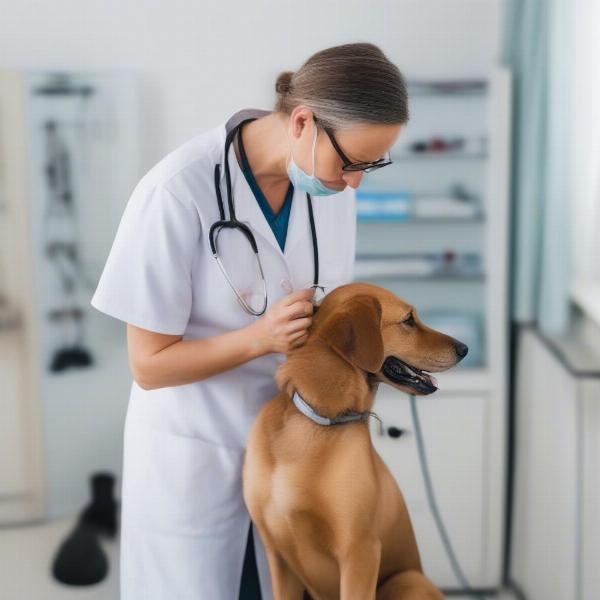Dyne high calorie liquid supplement can be a valuable tool for dog owners facing challenges with their pet’s appetite and nutritional intake. This comprehensive guide will explore the benefits, uses, and potential considerations associated with using Dyne for dogs. Whether your dog is recovering from surgery, experiencing a loss of appetite due to illness, or simply a picky eater, understanding how Dyne can support their nutritional needs is crucial.
Understanding the Need for Calorie Supplements in Dogs
Sometimes, dogs require more calories than their regular diet provides. This can be due to a variety of reasons, including:
- Illness: Diseases like cancer, kidney disease, and infections can increase a dog’s metabolic rate, requiring higher calorie intake.
- Surgery or Injury: Recovery often demands extra energy for healing.
- Geriatric Dogs: Older dogs may experience decreased appetite and difficulty absorbing nutrients.
- Picky Eaters: Some dogs are simply fussy and require calorie-dense supplements to maintain a healthy weight.
- Pregnancy and Lactation: These stages require significantly increased caloric intake.
When a dog isn’t consuming enough calories, they can lose weight, become weak, and experience a decline in overall health. Dyne high calorie liquid offers a palatable and convenient way to address these concerns.
What is Dyne High Calorie Liquid?
Dyne is a high-calorie liquid supplement specifically formulated for dogs. It’s packed with essential nutrients, vitamins, and minerals to help support dogs who are not eating enough or need a boost in their caloric intake. It’s a palatable option for even the pickiest of eaters, coming in various flavors to entice finicky appetites.
When to Consider Dyne for Your Dog
Dyne can be beneficial in a variety of situations:
- Post-Surgery: Helps support the body’s healing process.
- During Illness: Provides much-needed nutrients when appetite is suppressed.
- Geriatric Care: Aids in maintaining weight and energy levels.
- Weight Gain: For underweight dogs or those struggling to gain weight.
- Appetite Stimulation: Can encourage eating in picky eaters.
How to Administer Dyne
Dyne is typically given orally, either directly into the mouth with a syringe or mixed with food. Always follow the instructions provided by your veterinarian regarding dosage. While generally safe, it’s important to consult with your vet before starting your dog on any new supplement.
Potential Side Effects and Considerations
While Dyne is generally well-tolerated, some dogs might experience mild digestive upset, such as diarrhea or vomiting. If this occurs, consult your veterinarian. They may recommend adjusting the dosage or suggest an alternative supplement.
 Veterinarian Examining Dog for Dyne Suitability
Veterinarian Examining Dog for Dyne Suitability
Choosing the Right Dyne Product
Dyne comes in various flavors and formulations, so you can choose the one that best suits your dog’s needs and preferences. Your veterinarian can help you determine the appropriate type and dosage.
Conclusion
Dyne high calorie liquid can be a valuable addition to a dog’s diet in specific circumstances. It provides essential calories and nutrients when dogs are unable or unwilling to consume enough food. Always consult your veterinarian before starting your dog on Dyne or any new supplement to ensure it’s the right choice for your pet’s individual needs.
FAQ
- Is Dyne safe for puppies? While Dyne is generally safe, it’s crucial to consult your vet before giving it to a puppy as their nutritional needs differ significantly.
- Can I mix Dyne with my dog’s regular food? Yes, Dyne can be mixed with food to encourage consumption.
- How long can I give my dog Dyne? The duration of use should be determined by your veterinarian based on your dog’s individual needs.
- What if my dog doesn’t like the taste of Dyne? Dyne is available in different flavors; your vet can help you find one your dog prefers.
- Are there any alternatives to Dyne? Several other high-calorie supplements are available for dogs. Consult your veterinarian for suitable alternatives.
- Can Dyne be given to pregnant or lactating dogs? Yes, but always under the guidance of a veterinarian to ensure proper dosage.
- What are the signs of a dog needing a calorie supplement? Weight loss, lethargy, and decreased appetite are some signs that your dog might need a calorie supplement.
ILM Dog is a leading international pet website dedicated to providing expert advice on dog care and wellbeing. From breed selection to health, training, and nutrition, ILM Dog offers a wealth of resources for dog owners worldwide. We are committed to providing accurate and up-to-date information to help you give your furry friend the best possible care. For more information on dog nutrition and other related topics, please explore our website or contact us at [email protected] or +44 20-3965-8624. ILM Dog – Your trusted source for all things dog!